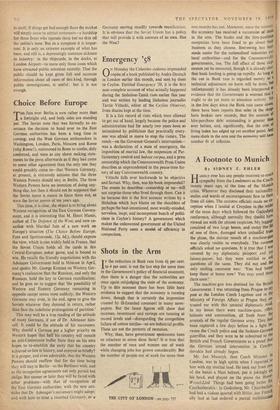Choice Before Europe
THE fuss over Berlin is now rather more, than k a fortnight old, and both sides are standing pat. The Soviet note that was formally to an- nounce the decision to hand over to the East German authorities has been a long time in coming; and the West German ambassadors in Washington, London, Paris, Moscow and Rome (why Rome?), summoned to Bonn to confer, duly conferred, and were as coy about making state- ments to the press afterwards as if they had come to some other agreement than the only one they could possibly come to—that Western Germany, at present, is extremely anxious that the three Western Powers should stay in Berlin. The three Western Powers have no intention of doing any- thing else, but then it should not be supposed that the Soviet move is meant to force them out, as were the Soviet moves of ten years ago, This time, it is clear, the object is to bring about Western recognition of the East German Govern- ment, and it is interesting that M. Henri Massis, author of The Defence of the West, and now co- author with Marshal Juin of a new work on Europe's. situation (The Choice Before EurOpe, Eyre and Spottiswoode, 12s. 6d.), should express the view, which is one widely held in France, that the Soviet Union holds all the cards in this Central-European poker game, and is bound to win. He recalls the friendly negotiations with the Adenauer Government held in Moscow in April, and quotes Mr. George Kennan on Western Ger- many's realisation that the Russians, and only the Russians, hold the key to German reunification; and he goes on to suggest that 'the possibility of Western and Eastern Germany remaining in opposite camps seems most unlikely; the Western Germans may even, in the end, agree to give the Soviets whatever they demand in return, rather than face the indefinite prolongation of partition.'
This may well be a true reading of the attitude of many Germans, if not of Dr. Adenauer him- self. It could be the attitude of his successors. Why should a German put a higher priority on Western hopes that half his country will remain an anti-Communist buffer State than on his own hopes to re-establish the unity that his country achieved so late in history, and enjoyed so briefly? It is proper, and even admirable, that the Western Powers should reaffirm that for the time being they will stay in Berlin—as the Berliners wish, and as the occupation agreements not only permit but oblige. But sooner or later they will be faced with other problems—with that of recognition of the East German authorities; with the new atti- tudes that Dr. Adenaper's successors might adopt; and with how to treat a reunited Germany, or a Germany moving steadily towards reunification. It is obvious that the Soviet Union has a policy that will provide it with answers of its own. Has the West?






























































 Previous page
Previous page